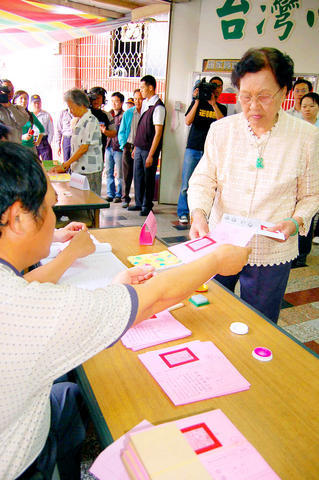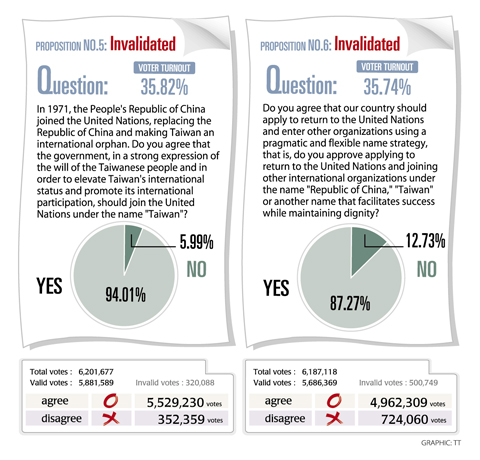The failure of both UN membership referendums could block Taiwan's attempt to participate in international organizations, but may also present an opportunity to reform the referendum system, political observers said.
"The international community may misinterpret what the failure of both referendums means," said Herman Chiang (江岷欽), a public administration professor at Taipei University. "We may think the referendums are not important, but it may have an impact on our future attempts to join international organizations."
On top of serving as a record of what the public thinks on certain subjects, "referendums are used in Taiwan as a tool for political mobilization -- the Democratic Progressive Party [DPP] used its referendum to boost support, while the Chinese Nationalist Party [KMT] used theirs as a counter-mechanism," he said.

PHOTO: YANG MEI-HUNG, TAIPEI TIMES
Lacking a close understanding of the political and social context in the nation, "Western countries may misunderstand the mainstream public opinion in Taiwan," Chiang said.
Tseng Chien-yuan (
"Since even the more conservative option of the two referendum prepositions -- the KMT's `return to the UN' -- did not pass, it will be a problem for the new government to tell the international community what the Taiwanese people really want."

One challenge for the new president will therefore be to explain to the world the real meaning behind the failure of the referendums, Tseng said.
"We have to follow closely how [KMT president elect] Ma Ying-jeou [馬英九] explains to the international community that we long for participation in global affairs," Chiang said.
On the other hand, National Taiwan University political science professor Ger Yeong-kuang (
"[The failure of referendums] will neither have an impact on domestic politics, nor on our participation in international affairs," Ger said.
"For domestic politics, nothing happened when the referendums failed last time," he said. "As for our participating in international organizations, we wouldn't have been accepted right away if the referendums passed and we will continue our efforts even though the referendums fail."
What is of greater importance, Ger said, is for the new president to find a way to make a breakthrough in cross-strait and international relations.
Another concern for observers were potential reforms to the referendum system.
"It would mean that the referendum system is stable if at least one of the referendums passes," Tseng said ahead of the vote.
The outcome, however, went the other way.
"We surely need a reform in the system -- the referendum thresholds may need to be lowered so that the power to make a referendum initiative can really be given back to the people," Chiang said.
"The referendum should no longer be a tool for political mobilization. It's an insult to the system," he said.
While also optimistic about reforms, Tseng said he was worried about the future direction they would take.
"With the KMT dominance [in legislature], the reform may go in the direction of banning the grouping of referendums with elections," he said.
If such a reform occured, it would hurt the referendum system and would be a step backward for democracy, he said.
Eric Suy-Verburg, former under-secretary for the UN's Office of Legal Affairs, said that the DPP referendum "for the time being, is unrealistic."
"In previous UN general assemblies, there were always the same reactions [to reject Taiwan's bid] because of obstruction from the People's Republic of China," he said.
The KMT version, he said, was a bit more "balanced" because it does not call for the rigidity of only applying for full UN membership under a particular name, unlike the one pitched by the DPP.
However, the seasoned politician from Beligum said "there is never a `never' in international politics" and that "things may change."
"Taiwan should find new ways, new avenues and new openings [in its UN bids]. And it should make more friends that support its position. Be patient," he said.
Bruno Kaufmann, president of the Germany-based Initiative and Referendum Institute Europe, questioned if the referendum, as a mechanism for people to express their will, is being fully and correctly used by Taiwanese.
During his tour of polling booths yesterday, Kaufmann noticed that some people were subtly discouraging people from casting referendum ballots by ushering the voters straight to the polling booth, bypassing the table where they could pick up the referendum ballots.
He lamented that neither referendum had succeeded because it only "educates the people not to participate and it rewards the non-participants."
People will become disinterested and jaded about referendums as a mechanism if they persistently see that their affirmative votes do not count, he said.
Eva Tseng (鄭心瑜), a member of the Washington-based lobbist group Formosa Association for Public Affairs' youth group, said that the recent US denounciations of the referendums may have been a major factor in people's apathy toward them.
"It is unfair that the US had a say in the democratic process of another nation," she said.

Alain Robert, known as the "French Spider-Man," praised Alex Honnold as exceptionally well-prepared after the US climber completed a free solo ascent of Taipei 101 yesterday. Robert said Honnold's ascent of the 508m-tall skyscraper in just more than one-and-a-half hours without using safety ropes or equipment was a remarkable achievement. "This is my life," he said in an interview conducted in French, adding that he liked the feeling of being "on the edge of danger." The 63-year-old Frenchman climbed Taipei 101 using ropes in December 2004, taking about four hours to reach the top. On a one-to-10 scale of difficulty, Robert said Taipei 101

Taiwanese and US defense groups are collaborating to introduce deployable, semi-autonomous manufacturing systems for drones and components in a boost to the nation’s supply chain resilience. Taiwan’s G-Tech Optroelectronics Corp subsidiary GTOC and the US’ Aerkomm Inc on Friday announced an agreement with fellow US-based Firestorm Lab to adopt the latter’s xCell, a technology featuring 3D printers fitted in 6.1m container units. The systems enable aerial platforms and parts to be produced in high volumes from dispersed nodes capable of rapid redeployment, to minimize the risk of enemy strikes and to meet field requirements, they said. Firestorm chief technology officer Ian Muceus said

MORE FALL: An investigation into one of Xi’s key cronies, part of a broader ‘anti-corruption’ drive, indicates that he might have a deep distrust in the military, an expert said China’s latest military purge underscores systemic risks in its shift from collective leadership to sole rule under Chinese President Xi Jinping (習近平), and could disrupt its chain of command and military capabilities, a national security official said yesterday. If decisionmaking within the Chinese Communist Party has become “irrational” under one-man rule, the Taiwan Strait and the regional situation must be approached with extreme caution, given unforeseen risks, they added. The anonymous official made the remarks as China’s Central Military Commission Vice Chairman Zhang Youxia (張又俠) and Joint Staff Department Chief of Staff Liu Zhenli (劉振立) were reportedly being investigated for suspected “serious

Nipah virus infection is to be officially listed as a category 5 notifiable infectious disease in Taiwan in March, while clinical treatment guidelines are being formulated, the Centers for Disease Control (CDC) said yesterday. With Nipah infections being reported in other countries and considering its relatively high fatality rate, the centers on Jan. 16 announced that it would be listed as a notifiable infectious disease to bolster the nation’s systematic early warning system and increase public awareness, the CDC said. Bangladesh reported four fatal cases last year in separate districts, with three linked to raw date palm sap consumption, CDC Epidemic Intelligence